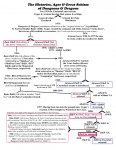Ratskinner
Adventurer
Even now, how much easier would it be to recruit a group at your local FLGS to play a Pathfinder campaign versus say, GURPS or Runequest?
<snippage>
We had opportunities to explore the why of that rift, to explore the dimensions behind the theory and game designs of each system, and to better understand our own preferences in gaming. To me, this is a massive positive of the "Edition Wars," which makes me a little bit hesitant to label anything an "edition war," or to even discount someone else's opinion, even if it's couched somewhat in vitriol.
You see a schism, I see a healthy diversity.
Looked at through another prism, in the past people who wanted to play a fantasy RPG had one real choice. Now they have many. They can pick a game that caters best to their tables' preferred play style. They can try out Pathfinder or Dungeon World or Fate or GURPS or Savage World or 13th Age. I'm sure I've left some important ones off that list. Seems like lately there's more cool, professional games out that there than ever before. This can only be good for the hobby.
I suspect that the only people the 'schism' is really bad for is Wizards of the Coast.
Going forward there may not be One Game To Rule Them All. And that's fine. As long as you are open to new gaming experiences I doubt you'll have trouble finding a table to play at.
I think that diversity is/would be a great thing. However, I think there's a great deal of geographic divergences when it comes to the penetration/availability of alternatives to D&D. Some folks around here have commented that finding a Savage Worlds or Fate table to play at is as easy to find a D&D table. That very much doesn't match my experience, where Pathfinder/3.5 seems very dominant in my area.
Certainly WotC will be the primary "losers" in this diversity. However, I do think that there is a bit of a risk for the larger community. Namely, that D&D has always served as the gateway to the rpg world (even when it does a bad job of it.) If D&D ceases to serve that function...well, I don't know how that turns out. Does another game take its place? Does the community adapt to some new paradigm? Does is spell doom for TTRPGs?
I will say that, generally, I'd like to see the community get away from latching onto "my game" so much. Playing a variety of games can really help you reflect on how you like things to go, and often even make you better at having fun with the game you do consider you first choice. Also, I think its the only defense against the risk of drifting too far into an echo chamber of your favorite playstyle or mechanics..

